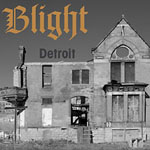|
|
 |
Dusted Reviews
Artist: Blight Album: Detroit: The Dream is Dead Label: Touch and Go Review date: Mar. 10, 2006 |

|
|
|
 |
This collection of music is subtitled “The Collected Works of a Midwest Hardcore Noise Band, 1982.” That pretty much sums it up. For four months, Blight – a project consisting of Meatmen vocalist Tesco Vee, former Fix guitarist Steve Miller and bassist Mike Achtenberg, and drummer Pat Clark – burned out and rusted away in Detroit, Michigan, to the general disinterest of punk rockers, hardcore kids, and other bands in general. It seemed that no one wanted to hear their politics, see Tesco’s meaty frame splattered with Day-Glo paint, or endure a sermon at a show.
From what punk rock history books and those who were there tell us, though, this is no surprise. Groups with a message and a different style of playing it, like the Minutemen, and professional irritants like the Nig-Heist or Flipper are today lauded for cutting through the sameness of punk rock, the militant and violent qualities attributed to straight-edge hardcore, doing something different to break up the caste systems that had sectioned off the music in its infancy. Go back, however, and you’ll find that these bands were by and large hated or ignored by the showgoing public, a mentality that changed by region. Black Flag and Minor Threat may have appleseeded the American landscape with touring in the DIY spirit, often eschewing clubs for VFW halls and other non-traditional show spaces. But in doing so, they gave the less impressionable the notion that their music was what hardcore was all about. Anything veering from hard and fast often got pushed to the side, and its fans stomped into the floor. This made for a hostile work environment for a band like Flipper, known drug addicts who could taint the vibe of any young cementhead’s killer time with their plodding, nihilistic sounds and sets extended well past the endurance of many attendees’ patience.
Blight cast itself in Flipper’s shadow as much as its hometown’s. Detroit in 1982, a hulking wreck of collapsing American industry, danger and malaise, seems now like the kind of place that was far worse than you could imagine it, where the dejected became first careless, then violent, where those with the means fled and were replaced by weeds, addicts, the downwardly mobile, the trapped. They wrote nine songs that exemplified and reveled in this mindset, four of which were released as a 7” single on Corey Rusk’s fledgling Touch and Go label. Having released records by the Fix, Necros, Negative Approach, the Meatmen and L-Seven, Touch and Go took an aesthetic left turn by taking on Blight, one not without precedent in the burgeoning pantheon of punk rock, but one with foresight not quite determined. Fans of the Meatmen bought the single and no doubt scratched their heads before filing it away. There’s nothing catchy or particularly memorable about any of their songs; they are tinny dirges with plodding, phased-out bass lines, atonal noise guitar, clumsy slow drumming, and Tesco Vee screaming about social injustice, violence, the rich fucking over the poor, and the crumbling world around him. The song titles are telling: “Bludgeon,” “Be Stupid,” “Prophet of Doom,” “Armageddon.” They were the harbinger of bad tidings that would foretell the region’s continued sink into poverty, crime, and unemployment, where dreams go to die. Just like it says on the front. And in short order, the band itself followed suit, and offed itself.
Is Blight essential punk rock? Not really; like I said, the songs seem to melt into one another. Aside from some weirder art trip on “Seven Winds over the Gobi Desert,” the music is more style and content than substance or memory. If you’ve heard and enjoyed Flipper, Ruin, Stick Men with Ray Guns, or the Crucifucks, this isn’t going to be much of a surprise. If you’re just catching on with bands like Pissed Jeans, Clockcleaner or Violent Students, you’ll get to see part of where their sound came from. As a document of the times, though, The Dream is Dead is priceless. All nine of the band’s studio tracks – their entire recorded legacy – is included, along with two demo versions and a 16-minute live set, opening for the Dead Kennedys seconds before impact, showcasing how the band could totally oppress an audience. If they’d have kept going they’d have all had one giant stroke and that would have been it.
One thing that does distinguish Blight from their contemporaries is the complete lack of a sense of humor. They’re not having an end-of-the-world rager like Flipper, not joking about like the Meatmen, not foraging through horror and science-fiction subject matter like Stick Men did. They’re singing about real problems facing ’80s American society, without allegory, particularly that which centered around factory-based economies such as the one they lived near. That they may not have accurately been able to tell the terrifying tale with methods already used by other bands to more garish ends is behind the point. They have more in common with Crass, Action Pact, and other Thatcher-era peace punk bands of the UK, just not musically. That they didn’t have enough time to adequately develop could be a reason for this, but perhaps they were too consumed with fear of the future to play anything else other than noise sludge. Tesco screams out, “You’re not black / You’re not white / You’re blight,” intoning a prescience lost on many of their contemporaries as they lashed out, helpless to contain the spread of damage that would go on to tarnish their land and lives, and that of those around them.
By Doug Mosurock
|







